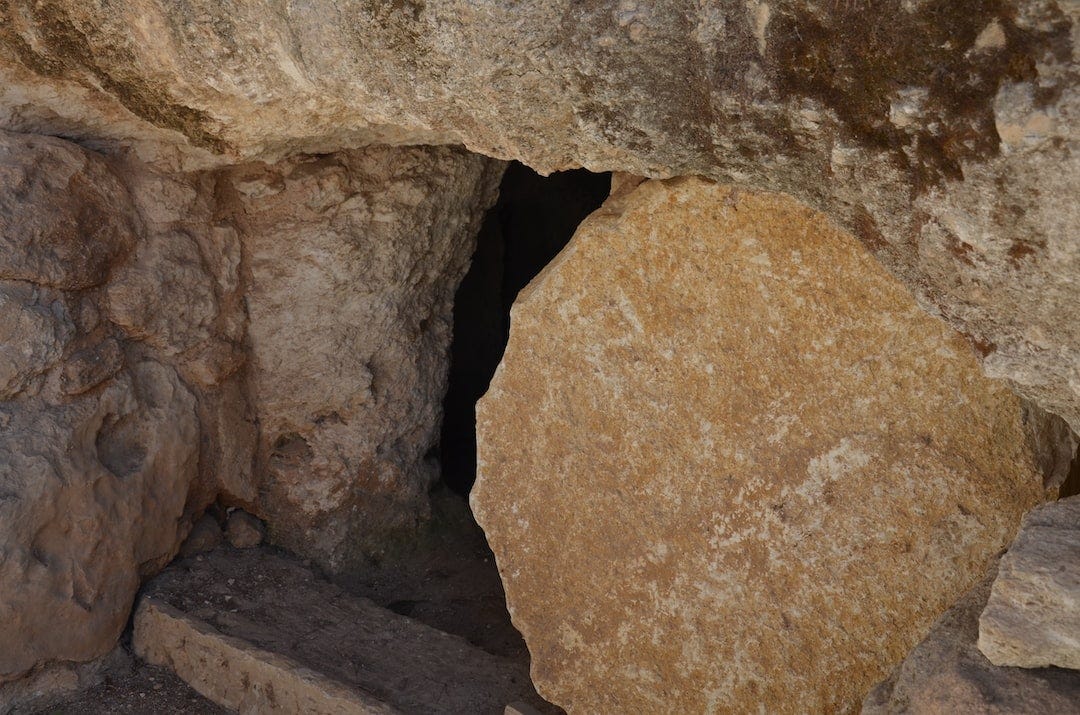I Believe in the Bodily Resurrection of Jesus Because...
The Scripture records the Resurrection of Jesus and the Scripture is a sufficient and reliable record.
“So firm is the ground upon which the Gospels rest, that the very heretics themselves bear witness to them, and, starting from these (documents), each one of them endeavors to establish his own particular doctrine.” ~ Irenaeus, Against Heresies III
My strong conviction that Jesus was bodily resurrected is founded upon the premise that Old Testament prophecy foretold it and the New Testament accounts provide reliable records of it. This means that any argument against this fact carries with it the burden of proof. Various evidence suggests that those who wish to contest the resurrection are in fact obligated to substantiate their case:
The presence of eyewitnesses at the time of Jesus provides an authentic record for his life and teachings.
The accounts were further guarded, disseminated, and controlled by the Jerusalem Church, which held these records in high esteem (Rom. 16:17; 1 Cor. 7: 10, 12).
The high view the church had for its “traditions” (cf. Rom. 16:17; 1 Cor. 7: 10, 12). By tradition I mean accounts as well as teachings that were recorded and handed down.This gives credence to the truth that these teachings were accurately passed down from that point on from generation to generation.
The honesty of early Christians in transmitting Jesus' hard sayings (Mark 9:2, 10:18, 13:32) shows a commitment to accurate transmission.
Problems in the epistles are NOT artificially inserted into the Gospels. This indicates the Gospels are not inventions in an attempt for the early church to deal with its challenges.
The Scripture records it and the Scripture is a sufficient and reliable record.
Many scholars have concluded that Acts and the Gospels were composed prior to the destruction of Jerusalem in AD 70, as this event is not documented in Acts. Paul's death is also absent from the text, hinting at a date of completion prior to AD 64. How could their demises would be omitted? The best explanation: Acts was completed before they happened. So, Acts was written before Paul’s death in AD 64. Most believe that Mark was written first, around the late 50s and Luke second, circa AD 62. Remember, the book of Acts is also by Luke. This timeline is within two decades of the events. This timeline places the writing so close to the events they describe such that there is not enough time for myths or legends to develop.
IRENAEUS ON THE FOUR GOSPELS
Irenaeus (ca. 130-202 AD) was a student of Polycarp, Bishop of Smyrna and a disciple of John the Apostle. Irenaeus wrote this about the four Gospels in Against Heresies III:
For as there are four quarters of the world in which we live, and four universal winds, and as the Church dispersed over all the earth, and the gospel is the pillar and base of the Church and the breath of life, so it is natural that it should have four pillars, breathing immortality from every quarter and kindling the life of men anew. Whence it is manifest that the Word, the architect of all things, who sits upon the cherubim and holds all things together, having been manifested to men, has given us the gospel in fourfold form, but held together by one Spirit.
This relays the perspective that the early church championed. The early church was of the view that all four Gospels were valid and necessary in order to paint a complete picture of Jesus - his life, character, and ministry. Together, these accounts present an impression of the Messiah that is impossible to achieve from any single gospel alone.
The New Testament Witnesses Don’t Sound Like Frauds or Fakes
The Gospels show the work of thoughtful, sincere people. The wisdom found within these works is remarkable. In addition, the structure and clarity that can be found in this writing suggests stability and confidence. It is clear that the authors put forth an effort to ensure accuracy and honesty, which is evidenced by their lofty moral code that strives to stay true to both truth and God.
RESURRECTION IS NOT A NEW TESTAMENT “INVENTION”
Resurrection (including the Messiah's) is not a NT invention. During the Second Temple Judaism era, belief in resurrection meant it was PHYSICAL and BODILY. “Resurrection” was not a term for just general “life after death”, it always meant reembodiment during this time. For example, 2 Maccabees 7:1-23 contains grisly accounts of Jewish martyrs. They actually taunt their torturers. How? They assured their killers that they will receive back (from Yahweh) the physical bodies that are now being torn apart.
An exception is the Sadducees, who denied any doctrine of post-mortem existence (Mark 12:18; Josephus, War 2:165). The Pharisees affirmed a future embodied existence. An example of this belief is from the Pharisaic Mishnah, Sanhedrin X, 1:
All Israelites have a share in the world to come.... And these are they that have no share in the world to come: he that says there is no resurrection of the dead prescribed in the Law, and [he that says] that the Law is not from Heaven, and an Epicurean.
The Old Testament predicts RESURRECTION and the New Testament records it
Let us consider Isaiah's "Suffering Servant" passages, historically understood to speak of the forecoming Messiah. Isaiah 52:13 predicts that after the Suffering Servant’s atoning death, this Messianic figure "will be raised and lifted up and highly exalted".
Isaiah's Suffering Servant is actually Yahweh. Isaiah 53:10-11 foretells "though the LORD makes his life a guilt offering, he will see his offspring and prolong his days, and the will of the LORD will prosper in his hand. After the suffering of his soul, he will see the light of life and be satisfied". The resurrection of Jesus Christ fulfills Old Testament prophecy.
As John Piper wrote, “There is a self-authenticating glory in the gospel of Christ’s death and resurrection as narrated by the biblical witnesses.”
A saving knowledge of Christ crucified and risen is not the mere result of right reasoning about historical facts.
Gospel transformation comes from a spiritual illumination, when we recognize the Bible for what it is: a revelation of the truth and glory of God in the face of Christ—who is the same yesterday today and forever.
Belief in Christ's crucifixion and resurrection does not come from academic deduction alone.
Jesus promised His disciples the presence of the Holy Spirit to guide them into an understanding of all truth and to glorify Him. John 16:13: “When the Spirit of truth comes, he will guide you into all the truth ... He will glorify me”. The Holy Spirit opens our eyes to see the glory of Christ. We see Jesus as was in his life, death, and resurrection, as recorded in the gospels. The Holy Spirit prompts us to understand Jesus as irresistibly true and undeniably compelling. Through the work of this Spirit we are able to comprehend what Scripture reveals about our Savior, who is unchanging in His divine nature and perfect in character.
Sadly, those without saving knowledge can have difficulty discerning spiritual truths; 2 Corinthians 4:4 identifies Satan as the one responsible for clouding their perception of the gospel: “The god of this world has blinded the minds of the unbelievers, to keep them from seeing the light of the gospel of the glory of Christ, who is the image of God”. Yet God has provided a solution - He gives us a light in our hearts by which we can recognize its truth and glory: “For God, who said, ‘Let light shine out of darkness,’ has shone in our hearts to give the light of the knowledge of the glory of God in the face of Jesus Christ” (2 Corinthians 4:6). This illumination brings gospel transformation that blossoms when we see Scripture as it truly is – a glorious display of God's eternal faithfulness.
____________________________________________________________________________
ADDITIONAL RESOURCES:
Do the Resurrection accounts HOPELESSLY contradict one another?







